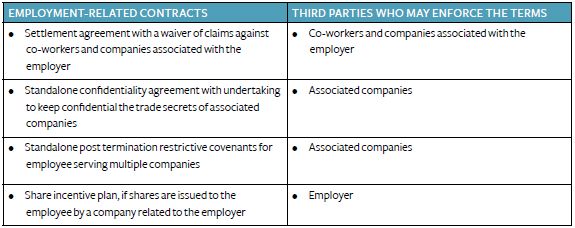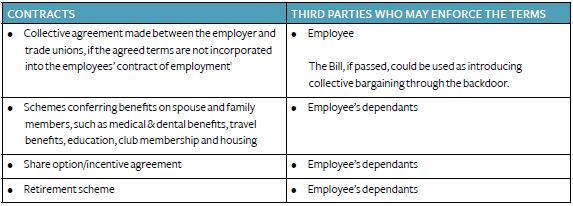Keywords: Hong Kong contracts, Rights of Third Parties Bill, privity of contract
The Contracts (Rights of Third Parties) Bill (the "Bill") has been introduced to the Legislative Council. If passed, Hong Kong will join a number of common law jurisdictions in reforming the age-old common law doctrine of "privity of contract".
Is this good news or bad news for employers? In our view, it is a mixed bag. There are some aspects of the Bill that employers can certainly take advantage of, but there are also pitfalls to look out for.
In this legal update, we consider the key changes and the risks from an employment perspective under the proposed new law anticipated by the Bill.
The Legislative Council is debating the Bill and we do not expect much movement until after October 2014.
What Is the Current Position?
Under the current law, only the parties to a contract have the right to enforce the contract terms. This means the contract cannot be enforced either by or against a third party (i.e., a party who did enter into the contract), even if it intends to confer certain rights or benefits on the third party.
For example:
- If an employee signs a settlement agreement with his employer to waive all his claims against his co-workers and against associated companies of his employer, his co-worker and the associated companies would have no right to enforce the settlement agreement if the employee breaches the settlement terms and brings legal proceedings against them.
- A business transfer agreement signed between two companies may sometimes confer benefits on the employees. Under the current law, an employee would have no right to enforce these terms against the companies if they fail to confer the benefits on him.
The current law has been criticised as artificial. In some situations, it can cause commercial hindrance.
What Are the Key Changes?
The Bill will impact upon current employment practices, benefits and incentive schemes.
Perhaps the first point to note is that the Bill will not give a third party the right to enforce a term of an employment contract against an employee.
For example:
- If an employee is required by his employment contract to courier parcels for the Company's customers, a customer cannot rely on the proposed new law and sue the employee for failing to deliver a parcel.
- If an employee is required by his employment contract to serve not only the employer, but also the holding company of his employer, the holding company cannot rely on the proposed new law and sue the employee for refusing to provide the services. The employment contract can only be enforced by his employer, being the party to the employment contract.
However, the Bill will give a third party the right to enforce (a) a term of the contract of employment against an employer and (b) a term of an employment-related contract (which we explain below) against a party to that contract.
In order to confer this right on a third party, (a) the contract must expressly provide for the right, or (b) the contract term must seek to confer a benefit on the third party.
This means in some cases, the third party will have the right to enforce an employment-related contract by bringing legal proceedings against the employer and the employee.
For the third party to have the right to sue, the contract must expressly indentify the third party by name, as a member of a class, or as answering a particular description. So long as the description of the third party in the contract is sufficiently specific, the new law will apply to a third party, even if the third party is not in existence when the contract is entered into.
In terms of remedy, the third party will be entitled to any remedy (e.g., money, benefits or both) that would have been available to him if he had been a party to the contract. Once the right of the third party has been crystallised, the contracting parties may not change or cancel the contract to extinguish or alter the third party's entitlement under that right without the third party's consent.
What Are the Opportunities and Risks?
As discussed above, the proposed legislation will not confer any right on a third party to enforce a term of an employment contract against an employee.
However, if the Bill is passed, it will facilitate a third party to enforce a wide range of employment-related contracts, such as:
- Compromise/settlement agreement
- Standalone confidentially agreement
- Standalone restrictive covenant
- Secondment agreement
- Share option/incentive agreement
- Collective agreement
- Retirement scheme
- Insurance cover
- Schemes conferring benefits on spouse and family members, such as medical & dental benefits, travel benefits, education, club membership and housing etc.
- Business transfer agreements
Where there is a contract between a customer and a company which anticipates the company engaging an independent contractor to perform work for the customer, the Bill will also facilitate the independent contractor (being the third party) to bring legal proceedings against the customer.
Under the Bill, it is possible to "contract out" of the new law. This means the parties to the contract can expressly agree that the new law is not applicable to that contract, with the result that a third party cannot rely on the new law and enforce the terms.
(i) The good news for employers
The good news for employers is that the Bill will facilitate enforcement of some types of contracts. For example:

However, to take advantage of the new law, the contract must be separate from the employment contract. In other words, the contract must be a standalone contract independent of the employment contract.
The parties to the contract must also expressly identify the third parties who are intended to benefit from the agreed terms. A third party who is not expressly identified in a contract will not enjoy any implied right of enforcement. The courts will not interpret the contract in a way that would imply any right for a third party to enforce the contract.
(ii) The bad news for employers
The bad news for employers is that the Bill will facilitate a third party in enforcing the following types of contracts and schemes against the employer. For example:

The following types of contract will also be affected by the new law:

If you do not wish to have these unintended effects on the new contracts, you should start reviewing the Company's standard contracts, staff handbook, schemes and policies and opt out of the application of the new law.
(iii) Contracts not affected by the Bill
Some contracts will not be affected by the Bill:
- The Bill will not affect contracts made before the legislation comes into effect.
- A third party cannot enforce any term in an employment contract against the employee. This means a confidentiality undertaking, a restrictive covenant or an intellectual property clause in an employment contract, worded to benefit a third party (say, a holding company of the employer), would remain enforceable only by the employer and not by the third party.
Take-away Points
Employers should keep an eye on the passage of the Bill and we will keep you updated.
If the Bill looks like coming into effect as law, then an employer should consider reviewing the range of employment and employment-related contracts and structuring them to maximise enforceability by third parties where this is desired and expressly excluding the law where it is not.
Originally published 14 August 2014
Footnote
Learn more about our Hong Kong office, Employment & Benefits, Insurance, Litigation & Dispute Resolution practices.
Visit us at www.mayerbrown.com
Mayer Brown is a global legal services organization comprising legal practices that are separate entities (the Mayer Brown Practices). The Mayer Brown Practices are: Mayer Brown LLP, a limited liability partnership established in the United States; Mayer Brown International LLP, a limited liability partnership incorporated in England and Wales; Mayer Brown JSM, a Hong Kong partnership, and its associated entities in Asia; and Tauil & Chequer Advogados, a Brazilian law partnership with which Mayer Brown is associated. "Mayer Brown" and the Mayer Brown logo are the trademarks of the Mayer Brown Practices in their respective jurisdictions.
© Copyright 2014. The Mayer Brown Practices. All rights reserved.
This article provides information and comments on legal issues and developments of interest. The foregoing is not a comprehensive treatment of the subject matter covered and is not intended to provide legal advice. Readers should seek specific legal advice before taking any action with respect to the matters discussed herein. Please also read the JSM legal publications Disclaimer.


